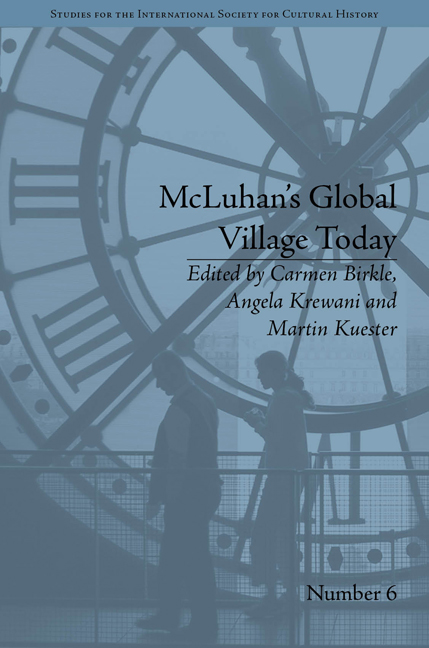Book contents
- Frontmatter
- CONTENTS
- List of Contributors
- List of Figures
- McLuhan's Global Village Today: An Introduction
- Part I McLuhan and Media Theory
- Part II McLuhan and Literature
- Part III McLuhan and Technical Media
- 11 Radio Voices: Reflections on McLuhan's Tribal Drum
- 12 McLuhan's Paradigms and Schafer's ‘Soundscape’: Parallels, Influences, Envelopes, Shifts
- 13 Literary Modernists, Canadian Moviegoers and the New Yorker Lobby: Reframing McLuhan in Annie Hall
- 14 The Animated Medium is the Animated Message (?): Reading Animated Moving Pictures with Marshall McLuhan
- 15 Marshall McLuhan and the Emergence of American Television Theory
- 16 ‘The Medium in Your Pocket’: A McLuhanian Approach to New Media
- Notes
- Index
16 - ‘The Medium in Your Pocket’: A McLuhanian Approach to New Media
from Part III - McLuhan and Technical Media
- Frontmatter
- CONTENTS
- List of Contributors
- List of Figures
- McLuhan's Global Village Today: An Introduction
- Part I McLuhan and Media Theory
- Part II McLuhan and Literature
- Part III McLuhan and Technical Media
- 11 Radio Voices: Reflections on McLuhan's Tribal Drum
- 12 McLuhan's Paradigms and Schafer's ‘Soundscape’: Parallels, Influences, Envelopes, Shifts
- 13 Literary Modernists, Canadian Moviegoers and the New Yorker Lobby: Reframing McLuhan in Annie Hall
- 14 The Animated Medium is the Animated Message (?): Reading Animated Moving Pictures with Marshall McLuhan
- 15 Marshall McLuhan and the Emergence of American Television Theory
- 16 ‘The Medium in Your Pocket’: A McLuhanian Approach to New Media
- Notes
- Index
Summary
Introduction
The political, social and cultural transformations which we experience in a digital globalized media culture raise new questions about the impact of technology on society, but also about the ensuing consequences for the individual. In this context the work of Marshall McLuhan is experiencing a revival. Not only did McLuhan predict some of these developments, but his work developed in a time of deep social and technological changes, with the impact of television and the first satellite being sent into space. It is therefore fruitful to read McLuhan's work again in the context of our current media culture.
In this essay I want to reread McLuhan in order to understand, as Derrick de Kerckhove states, how his work can serve as a ‘filter or lens’ to conceptualize media in the twenty-first century. Therefore I would like to discuss the example of smartphones and their role in our current media culture. Considering that it is important to note the deep technological developments that McLuhan could neither experience nor predict, this case study discusses some of the aspects of ‘new media’ after McLuhan. Furthermore I want to discuss to what extent McLuhan provides us here with ideas for a critique of some of the developments we are currently facing.
Smartphones have become a central symbol of the astonishing speed with which digital media culture has developed over the last few years as well as of the deep transformations that have occurred.
- Type
- Chapter
- Information
- McLuhan's Global Village TodayTransatlantic Perspectives, pp. 189 - 200Publisher: Pickering & ChattoFirst published in: 2014



